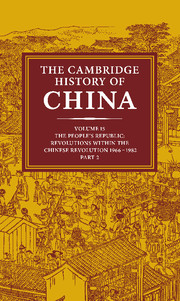Book contents
- Frontmatter
- 1 Mao Tse-tung's thought from 1949 to 1976
- PART I THE CULTURAL REVOLUTION: CHINA IN TURMOIL, 1966–1969
- PART II THE CULTURAL REVOLUTION: THE STRUGGLE FOR THE SUCCESSION, 1969–1982
- PART III THE CULTURAL REVOLUTION AND ITS AFTERMATH
- PART IV LIFE AND LETTERS UNDER COMMUNISM
- PART V THE SEPARATED PROVINCE
- 12 Taiwan under Nationalist rule, 1949–1982
- Epilogue: the onus of unity
- Appendixes: meetings and leaders
- Bibliographical essays
- Bibliography
- Index
- Map 1: China’s physical features
- Map 2. PRC: political (Wade–Giles romanization)
- Map 3. PRC: political (pinyin romanization)
- Map 7: Population
- References
12 - Taiwan under Nationalist rule, 1949–1982
from PART V - THE SEPARATED PROVINCE
Published online by Cambridge University Press: 28 March 2008
- Frontmatter
- 1 Mao Tse-tung's thought from 1949 to 1976
- PART I THE CULTURAL REVOLUTION: CHINA IN TURMOIL, 1966–1969
- PART II THE CULTURAL REVOLUTION: THE STRUGGLE FOR THE SUCCESSION, 1969–1982
- PART III THE CULTURAL REVOLUTION AND ITS AFTERMATH
- PART IV LIFE AND LETTERS UNDER COMMUNISM
- PART V THE SEPARATED PROVINCE
- 12 Taiwan under Nationalist rule, 1949–1982
- Epilogue: the onus of unity
- Appendixes: meetings and leaders
- Bibliographical essays
- Bibliography
- Index
- Map 1: China’s physical features
- Map 2. PRC: political (Wade–Giles romanization)
- Map 3. PRC: political (pinyin romanization)
- Map 7: Population
- References
Summary
When the Nationalist General Ch'en I received the Japanese surrender in Taipei on 25 October 1945 and took over as governor of Taiwan province, he assumed control of an area with a history very different from that of other parts of China. Settled relatively late, mainly by Chinese from Fukien province during and after the sixteenth century, Taiwan became a Japanese colony in 1895. The changes in material conditions and attitudes of the people of Taiwan during the fifty years of Japanese rule affected in important ways the subsequent development of Taiwan under the Nationalists.
An early and central objective of the Japanese was the establishment of law and order among a sometimes rebellious people. First through military operations and later through the creation of an extensive police apparatus, the Japanese introduced an administrative and legal system that fostered an orderly and peaceful society. Strict, and at times harsh and arbitrary, the Japanese rulers created an environment conducive to economic development and modernization that stood in sharp contrast to the civil war, warlordism, banditry, and military invasion by Japanese forces that plagued the Chinese mainland during the first half of the twentieth century.
Economic development in Taiwan was carried out along lines aimed primarily at benefiting the Japanese Empire rather than the people of Taiwan, but the process conferred on the Taiwanese a steadily rising standard of living. By 1945 the people of Taiwan enjoyed a style of life considerably more advanced than that of the average citizen on the mainland.
- Type
- Chapter
- Information
- The Cambridge History of China , pp. 813 - 874Publisher: Cambridge University PressPrint publication year: 1991
References
- 2
- Cited by



